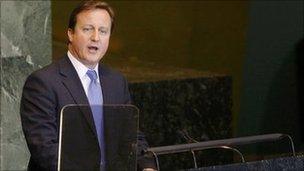Cameron faces sceptics with 'new interventionism' call
- Published
- comments

Mr Cameron praised the will of the coalition in the Libyan campaign
David Cameron's appearance at the United Nations General Assembly offered the chance for him to lay out a new doctrine on intervention.
It comes at an uneasy time for the UK, since the Libyan intervention and Palestinian membership beg questions about whether it is really prepared to abandon its role as America's principal ally.
Mr Cameron told the General Assembly, external that the organisation "needs a new way of working" in order to take advantage of the "massive opportunity" presented by the Arab Spring.
Although he characterised the overthrow of Libya's dictator as a victory of the people in that country he noted that "a coalition of nations had the will to act" in support of them.
Traditional pattern
The Libyan intervention seems to fit well with Mr Cameron's campaign pledge of restoring greater independence to Britain's foreign policy decision making.
After all, it was not an operation on the pattern of Iraq or Afghanistan where the US took the lead politically, and provided the overwhelming bulk of the combat power.
Yet even so, the Libyan operation would have been impossible without US involvement - both in actively bombing Colonel Gaddafi's air defences during the early days of the offensive, and in providing extensive intelligence and other support later.
It is also the case that many countries that are hostile to the traditional pattern of US-UK intervention or global policing regard the late Libyan intervention as "business as usual".
Among those who had to be persuaded in the Arab League or Security Council to support the attacking of Gaddafi's forces, the manner of his ouster and the sight of artillery loyal to the National Transitional Council shelling towns like Sirte give the lie to the idea enshrined in the enabling resolutions, that this was all meant to be a humanitarian intervention, protecting civilians from civil war.
It has determined countries like Algeria, Saudi Arabia, and, most importantly in the UN context, Russia, to avoid giving carte blanche again to any similar operation.
So today Mr Cameron called for "a credible resolution threatening tough sanctions" on Syria.
But the obstruction of such a resolution in the Security Council by Russia and China owes much to their perception that the Libyan intervention has simply presented an opportunity to advance long standing western aims in north Africa.
Palestinian bid
The question of Palestinian UN membership also provides a crucial test of whether Britain is actually able to act with greater independence internationally.
Interestingly, it is on questions of Israel-Palestine that the usual US-UK double act in the Security Council has sometimes faltered in the past.
So will Britain back the US in vetoing the attempt by President Mahmud Abbas to upgrade Palestinian membership at the UN?
France may have been on the same page as Britain on Libya, but it is ready to give limited support to elevating Palestinian representation in New York.
Tonight, however, Mr Cameron hinted that he would not support the Palestinian bid for recognition, saying that a UN resolution cannot be a substitute for the political will to re-start the stalled peace process.
He said in a TV interview this evening, "We will only support measures and processes if they actually help to get these talks back on track".
This line leaves unclear whether the UK will vote against the Palestinian membership bid or abstain.
The prime minister is thought to favour a "no" vote but some others around the cabinet table either support President Abbas or would prefer abstention.
While voting "no" would open Mr Cameron to criticism that the UK is behaving as "America's poodle", abstaining might not exactly soothe Arab opinion either.
In this sense countries like Syria, Iran, or even Russia will be able to label the Cameron approach on Libya or Palestine as a continuation of Britain's role in recent history as America's steadfast supporter, however articulately Mr Cameron made his arguments today.